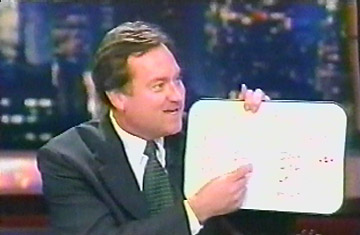
The late Meet the Press anchorman Tim Russert
(2 of 2)
At that time, the network decision makers start running the Edison/Mitofsky data through their models. Besides exit polls, these numbers also include telephone surveys of absentee and early voters from 18 key states. As the polls start closing at 7 p.m., Edison/Mitofsky also start providing the networks actual results from precincts in every state. The stations also toss the Associated Press's proprietary counts of the actual vote into the mix. Each network employs a team of statisticians and experts to analyze the numbers. Of the 14 staffers on the CBS desk, five have political science Ph.D.'s. NBC has a Google employee and physics Ph.D. on staff.
The math geeks crunch the numbers and present their recommendations to a senior staffer, who makes the final call. That decision, of course, is based on some key guidelines. NBC, for example, won't declare a winner until its models show less than 1 in 200 chance of error. And the networks won't declare a state's winner until polls in that state close. Since 2000, the networks have revamped their projection process, beefing up the qualifications of its decision-day staffers, adding more sophisticated statistical tools and instituting more dry runs. Gawiser, who was NBC's projection chief in 2000 (and still lives with the shame of that night), says the network had just three or four models in place for Bush-Gore. Now, NBC has "several hundred."
Despite all the technology and brainpower, projections will always be an inexact science. "There is still human intervention in this," says Gawiser. "Sometimes it's just a feeling that the data just doesn't seem quite right. I trust the numbers to a great degree, but I tend to be skeptical. We still have to be careful, and we will be careful."
To further prove there's some luck involved, some decision directors, like great athletes before the big game, have their superstitions. Since 2000, Gawiser and a few colleagues have eaten lunch at the same Rockefeller Center café on Election Day. They haven't botched an important call since. And since the Iowa caucuses in January, CNN political director Feist has donned the same blue and red tie on the night of every debate and primary. He still has his job.
ABC's Merkle, however, isn't the superstitious type. "I'm just focused," he says. "I'm more than ready. I'm anxious to get in there, and to be honest, I look forward to it being over." As long as that's when, to paraphrase Yogi Berra, it's really over.
See the Top 10 campaign video moments.
See pictures of John McCain's final push on the campaign trail.
